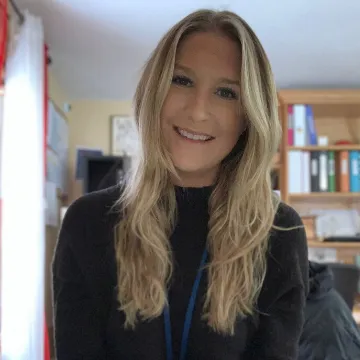Learning Diverse Perspectives Leads to Career in Mental Health Counseling

Nicole Bauer, RWU Class of 2015
After graduating RWU, with support from the Center for Career Services and Professional Development and dedicated RWU faculty members, Nicole Bauer applied to and was accepted at Suffolk University, where she earned her Masters of Science and Mental Health Counseling as well as a CAGS degree (Continued Advanced Graduate Study). In May of 2020, Bauer will be a Licensed Mental Health Counselor for the state of MA. Bauer now works at Devereux Advanced Behavior Health’s STARR program, where she supports individuals ages 4-12 individuals ages 4-12 that are in the custody of the Department of Children and Families.
What is one of your favorite memories from your time at RWU?
One of my favorite memories at RWU was being part of Habitat for Humanity for three years, and my last year as Vice President. I loved being part of the many builds that we did. I particularly loved going to Birmingham, Alabama, and Tutwiler, Mississippi. Not only did I get to learn a lot of new skills with building, but I got to meet some pretty incredibly people during my time at those places. From the people we served, to the people I traveled with, the whole experience was incredible. Giving back is something that I hold really close to my heart, but I also think that engaging in opportunities that Habitat gave me was really humbling. It helped me put my life into perspective and be truly grateful for what I have. It also taught me that you really don't need a lot to be happy in life, and the people we met there were true examples of that.
Tell us about your decision to major in psychology and American studies. How have these programs impacted your career path?
Psychology was a given because I always found the thoughts behind people’s actions interesting. American studies classes are required at RWU but it turned out I really liked American studies 101. The classes were beneficial because I was going to be working with all different demographics and ages. I learned so much more about people and culture, and how to work with a wide variety of individuals.
What do you do in your current position?
I work with individuals through a solution focused model that focuses on stabilization, identifying and treating safety/risk factors and determining best placements for them moving forward from STARR. I complete comprehensive assessments with these individuals to help them identify their strengths and needs. At STARR these individuals learn and practice coping and social skills, distress tolerance skills, anger and affect management, feeling/emotion identification, and begin to process, explore, and cope with their traumatic experiences through a trauma focused cognitive behavioral therapeutic model.
What do you find most fulfilling about your work?
I love seeing the people I work with get to a point where they actually feel safe and comfortable. I am fulfilled when I help people find their voices.

